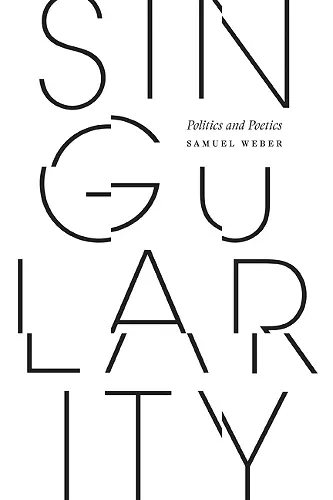Singularity
Politics and Poetics
Format:Paperback
Publisher:University of Minnesota Press
Published:25th May '21
Should be back in stock very soon

An influential thinker on the concept of singularity and its implications on politics, theology, economics, psychoanalysis, and literature
For readers versed in critical theory, German and comparative literature, or media studies, a new book by Samuel Weber is essential reading. Singularity is no exception. Bringing together two decades of his essays, it hones in on the surprising implications of the singular and its historical relation to the individual in politics, theology, economics, psychoanalysis, and literature. Although singularity has long been a keyword in literary studies and philosophy, never has it been explored as in this book, which distinguishes singularity as an “aporetic” notion from individuality, with which it remains historically closely tied.
To speak or write of the singular is problematic, Weber argues, since once it is spoken of it is no longer strictly singular. Walter Benjamin observed that singularity and repetition imply each other. This approach informs the essays in Singularity. Weber notes that what distinguishes the singular from the individual is that it cannot be perceived directly, but rather experienced through feelings that depend on but also exceed cognition. This interdependence of cognition and affect plays itself out in politics, economics, and theology as well as in poetics. Political practice as well as its theory have been dominated by the attempt to domesticate singularity by subordinating it to the notion of individuality. Weber suggests that this political tendency draws support from what he calls “the monotheological identity paradigm” deriving from the idea of a unique and exclusive Creator-God.
Despite the “secular” tendencies usually associated with Western modernity, this paradigm continues today to inform and influence political and economic practices, often displaying self-destructive tendencies. By contrast, Weber reads the literary writings of HÖlderlin, Nietzsche, and Kafka as exemplary practices that put singularity into play, not as fiction but as friction, exposing the self-evidence of established conventions to be responses to challenges and problems that they often prefer to obscure or ignore.
"One of the important thinkers of our time, Samuel Weber has published a magnum opus that is a must-read for anyone interested in poetics and theory today. Drawing on Kant, Nietzsche, Freud, Adorno, Benjamin, Derrida, and J-L Nancy, he analyzes singularization from ontology to politics, foregrounding questions central to the comparative humanities. Chapter by exhilarating chapter, this book models the abilities of critical theory to address myriad issues in singular ways."-Emily Apter, author of Unexceptional Politics: On Obstruction, Impasse, and the Impolitic
"There is a great pleasure in reading this book as it progresses because, even as it lays out the overarching theory of singularity, it also exemplifies, in its very form, the subject matter at hand. The various chapters in this book engage with singularity in innumerable ways and from any number of angles. Here, as is entirely appropriate, each entry remains wholly singular even as it is linked and connected to other moments and phenomena described. In this way we are given a philosophical, literary, and material demonstration of singularity, an issue that, as Samuel Weber makes clear, is both fundamental and critical for our, as well as any other, time."-James Martel, San Francisco State University
ISBN: 9781517910389
Dimensions: 229mm x 152mm x 51mm
Weight: unknown
512 pages